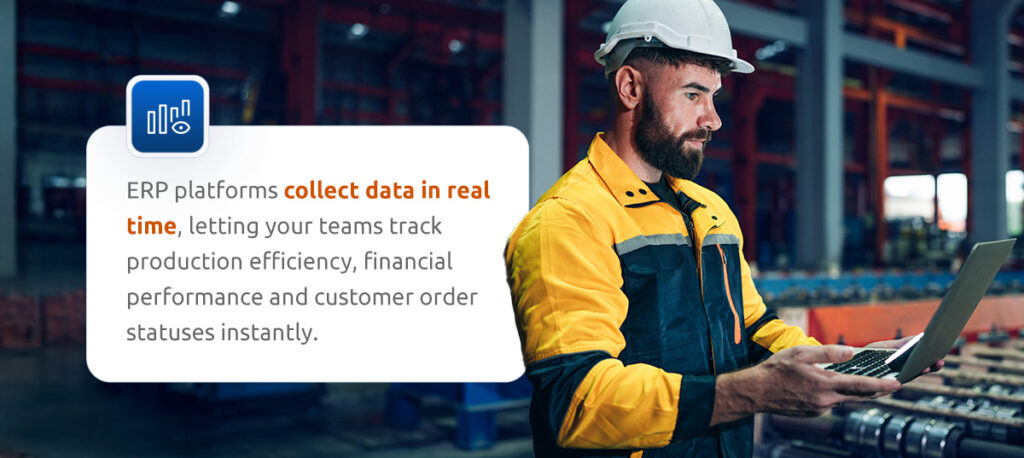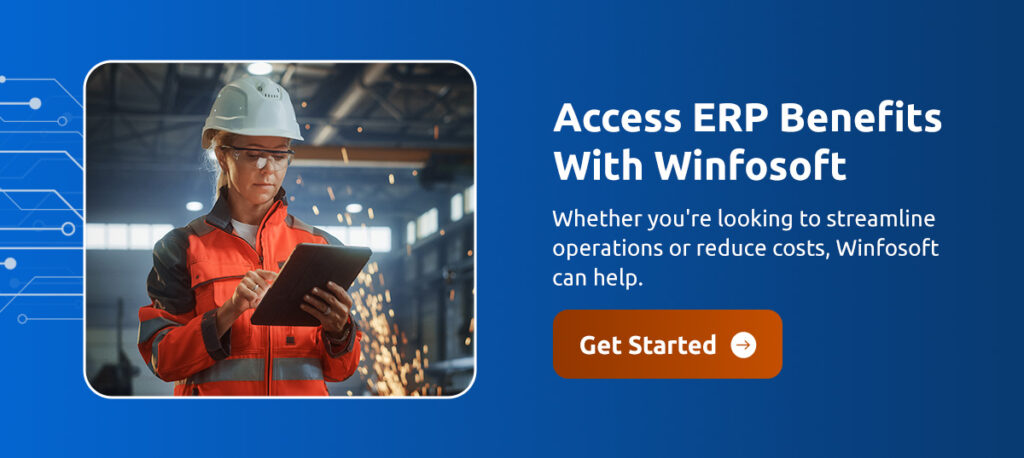
Running a business involves juggling dozens of moving parts. If all these departments operated separately, you’d see miscommunications and delays. When sales can’t access production schedules or customer service can’t see order statuses, overall productivity starts to fall. Over time, a disjointed approach can affect your business opportunities. But there’s a solution — enterprise resource planning (ERP) systems.
An ERP system is a tool that brings all your business functions together. Instead of using multiple software tools and disjointed workflows, you get a cohesive system that makes your operation more connected and efficient.
For industries like manufacturing and distribution, an ERP system can be transformative. C-suite executives in these industries know how important precision and efficiency are. If you’re looking to elevate your business, consider getting ERP software. Here are the benefits of enterprise resource planning solutions to help you boost productivity and accuracy.
Data silos are a significant obstacle to growth and efficiency. Knowledge workers spend almost 29% of their workweek looking for information. Having data stuck in each department slows decision-making and prevents your business from working at its best.
One of the advantages of using ERP systems is their centralized structure. They eliminate data silos by consolidating data from every department into a single platform. Instead of managing multiple spreadsheets or relying on various software, your employees work from a centralized space.
This consolidation ripples out across the company. Executives and managers can access real-time reports with up-to-date information from a single dashboard. Your teams can leave monthly reports behind and operate from the same playbook instantly. This design makes it easier to track supply chains, plan for changes and spot risks. With better visibility, you avoid delays, overstocking and incorrect information, making the entire operation more effective.
Manual processes slow businesses down. Dealing with time-consuming administrative tasks keeps teams from focusing on higher-level strategic work. An ERP system introduces automated processes, decreasing manual work. It can automate purchase orders, employee onboarding and payroll, increasing department productivity.
For manufacturing companies, automation makes quality control, production scheduling and equipment maintenance faster. Teams receive automatic alerts for tasks, preventing downtime. Meanwhile, ERP systems can handle routine accounting tasks like invoicing and expense tracking. Let the system review transactions so you can focus on forecasting and planning. Low-level task automation allows employees to take on higher-impact roles, driving growth and profitability.
Data breaches are a growing threat for companies globally and cost millions. To avoid expensive data breaches, you need effective security. ERP systems have advanced security features to protect sensitive information from attacks and unauthorized access.
Modern ERP platforms like Microsoft Dynamics 365 feature role-based access controls for better security. These give employees access only to role-relevant information. With limited access, ERP systems prevent information leakage and insider threats. Additionally, ERP systems often come with encryption. This feature secures files, backups and communications, protecting sensitive information from cyberthreats.
Another one of the benefits of ERP systems is their real-time visibility. Traditional reporting methods rely on historical data. Executives and managers often have to make decisions based on outdated information. An ERP system changes this by providing live dashboards and on-demand reports.

ERP platforms collect data in real time, letting your teams track production efficiency, financial performance and customer order statuses instantly. With access to updated information, you can make faster, more informed decisions. For example, businesses in the distribution industry can track order fulfillment in progress. If there are shipping delays, operations managers will see them immediately, letting them respond more quickly.
Real-time data means better forecasting, challenge-response and adaptability. Use your ERP solution to stay ahead of the competition and avoid blind spots in your processes.
Businesses need room to grow. With an ERP system, you can easily expand without overhauling your core processes or technology. Stand-alone software tools often require reconfigurations or replacements. ERP platforms grow with you, adjusting to higher transaction volumes and additional users. With cloud-based tools, you can easily add new features, tools and updates. Use ERP software to expand as needed without slowing down business success.
The advantages of ERP systems also extend to profits. Cost reduction is an integral part of business operations. ERP systems are an excellent way to support greater profit. When you use them to reduce manual labor, automate tasks and streamline workflows, you save time and money. This efficiency also means fewer errors, wasted resources and production delays.
Additionally, ERP systems consolidate your tools. With one system overseeing everything, you avoid paying for separate systems. Cloud-based systems reduce infrastructure costs since you don’t need expensive hardware or on-site servers. ERP systems decrease software costs, optimize production schedules and automate processes, resulting in savings across all departments.
Maintaining regulatory compliance can be a resource-intensive process. Highly regulated industries like metals and manufacturing must stay compliant to avoid penalties and reputational damage. Investing in a quality ERP system makes adhering to industry standards like ISO 9001 and other requirements easier.
ERP platforms feature built-in compliance features. They make all processes well-documented and traceable for more straightforward audits. With automatic tracking and audit trails, your company has a clear record of every transaction and inventory change. If an audit occurs, you have all the necessary information ready.
An ERP system encourages collaboration across departments. The centralized structure makes sharing and accessing information in real time easy. Instead of relying on outdated information or trying to track down the right file, teams can communicate quickly through the system.
Employees rely on email chains, spreadsheets, and manual reports without an ERP platform. These methods open your employees up to miscommunication and delay issues. With an ERP system, teams can see live inventory levels, pending orders and updated financial data. Real-time connectivity breaks down silos and promotes better teamwork.
Cloud-based ERP systems like Microsoft Dynamics 365 Enterprise make collaboration even more effective. Remote workers and branch offices can access the same data as on-site employees. Everyone works from the same system, leading to faster, better decisions and a unified approach to new challenges.

ERP systems open the door for your business, supporting better efficiency and productivity. But your business deserves more than a one-size-fits-all solution. You need an ERP platform tailored to your unique needs — and a partner with the expertise to make it happen. That’s where Winfosoft comes in.
As a Microsoft ERP Gold Certified Partner, Winfosoft specializes in implementing Microsoft Dynamics 365 Enterprise for metals, manufacturing and distribution companies. Our team of experts provides end-to-end support, from consultation and setup to ongoing management. Unlike other providers, we offer flexible, customized solutions designed to fit your business.
Whether you’re looking to streamline operations or reduce costs, Winfosoft can help. Our award-winning service and support ensure you’re never navigating ERP solutions alone. Get in touch with us and start your journey to more efficient business today!